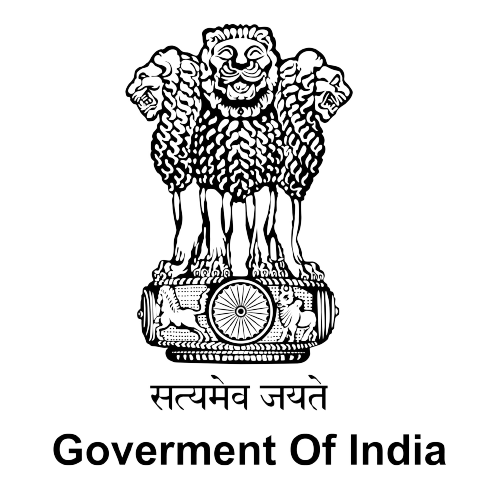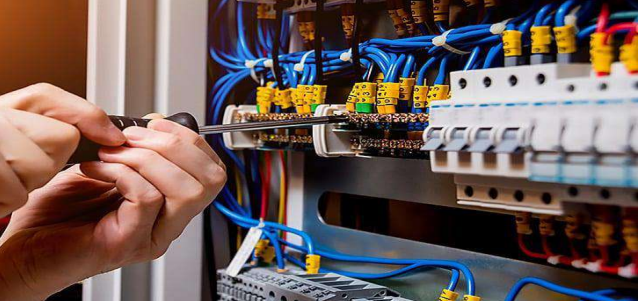

Electrician is high level diploma. The duration of this course is 2-year. Students are taught about things like installing or preserve a variety of approved wiring methods for dispensation of electrical light, radio, heat, power, and signalling utilization systems after this course. mostly, their work is in existing or new residential, commercial and industrial buildings and involves street and traffic signal and other outdoor above and below grade installations. It is career presenting in nature and provide many job opportunities for candidates after its successful completion.
| Duration | 2 years |
| Type | ITI Diploma |
| Eligibility | 10th |

(Duration: Two Years)
NSQF LEVEL- 5

During the two years duration of Electrician trade a candidate is trained on professional skills& knowledge, Engineering Drawing, Workshop Calculation & Science and Employability skill related to job role. In addition to this a candidate is entrusted to undertake project work and extracurricular activities to build up confidence. The Broad components covered during the course are given below:
First Year:- In this year the trainee learns about safety and environment, use of fire extinguishers, artificial respiratory resuscitation to begin with. He gets the idea of trade tools & its standardization, identifies different types of conductors, cables & their skinning & joint making. Basic electrical laws like Kirchhoff’s law, ohm’s law, laws of resistances and their application in different combinations of electrical circuit are practiced along with laws of magnetism. The trainee practices on circuit for single phase and poly-phase circuits for 3 wire /4 wire balanced & unbalanced loads. Skilling practice on different types & combination of cells for operation and maintenance is being done. Wiring practice with installation of different accessories like ICDP switch, distribution fuse box and mounting energy meters are practiced as per IE rules for hostel/residential building, workshop and its fault detection are done by trainee. The trainee will practice for pipe & plate earthing. Different types of light fitting are to be done like HP/LP mercury vapour and sodium vapour are prominent. The trainee will practice on different types of measuring instruments like multimeter, wattmeter, energy meter, phase sequences meter, frequency meter, for measurement of electrical parameters in single & three phase circuits. He will gain skill on range extension, calibration and testing of meters. Practice for dismantling, assembling and testing of heating element equipment, induction heating equipment, grinding machines and washing machines will be done by trainee. Skill will be gained on transformer for operation, efficiency, series parallel operation, replacement of transformer oil and combination of single-phase transformers for 3 phase operation. The trainee will practice on winding of small transformer.
Second Year:- In this year the trainee will study the details of electrical rotating machines viz. DC machines, induction motors, alternators & MG sets and practice on them. The trainee will practice on determining characteristics, their performance analysis, starting, speed control and reversing direction of rotation of machines. He will practice on parallel operation & synchronization of alternators, winding practice and over hauling will be practiced for DC machine and induction motors. Practices on diodes for bridge rectifier, switching devices & amplifiers by electronic components, different wave shape generation and testing by CRO. Designing control cabinet, assembling control elements and their wiring are to be practiced. Speed control of AC/DC motors by electronic controller will be practiced. The trainee will practice on testing, analyzing and repairing of voltage stabilizer, emergency light, battery charger, UPS and inverter. He will gain knowledge of thermal, hydel, solar & wind energy systems. The trainee will practice on distribution system, domestic service line and accessories & their protection by practicing on relay and circuit breaker for operation and maintenance.
| Sr No. | Course Element | National Training Hours |
|---|---|---|
| 1 | Professional Skill (Trade Practical) | 2158 |
| 2 | Professional Knowledge (Trade Theory) | 504 |
| 3 | Workshop Calculation & Science | 168 |
| 4 | Trade Engineering Drawing | 252 |
| 5 | Employability Skills | 110 |
| Total | 4160 |
Distribution of training on Hourly basis: (Indicative only)
| Total Hours/Week | Trade Practical | Trade Theory | Work shop Cal. &Sc. | Engg. Drawing | Employability Skills | Extracurricular Activity |
|---|---|---|---|---|---|---|
| 40 Hours | 25 Hours | 6 Hours | 2 Hours | 3 Hours | 2 Hours | 2 Hours |
For the purposes of determining the overall result, weightage of 100% is applied for six months and one year duration courses and 50% weightage is applied to each examination for two years courses. The minimum pass percent for Trade Practical and Formative assessment is 60% & for all other subjects is 33%. There will be no Grace marks.
Electrician General: Installs, maintains and repairs electrical machinery equipment and fittings in factories, workshops powerhouse, business and residential premises etc. Studies drawings and other specifications to determine electrical circuit, installation details etc. Positions and installs electrical motors, transformers, switchgears. Switch boards and other electrical equipment, fittings and lighting fixtures. Makes connections and solders terminals. Tests electrical installations and equipment and locates faults using megger, test lamps etc. Repairs or replaces defective wiring, burnt out fuses and defective parts and keeps fittings and fixtures in working order. May do armature winding, draw wires and cables and do simple cable jointing. May operate, attend and maintain electrical motors, pumps etc.
Electrical Fitter: fits and assembles electrical machinery and equipment such as motors, transformers, generators, switchgears, fans etc., Studies drawings and wiring diagrams of fittings, wiring and assemblies to be made. Collects prefabricated electrical and mechanical components according to drawing and wiring diagrams and checks them with gauges, megger etc. to ensure proper function and accuracy. Fits mechanical components, resistance, insulators, etc., as per specifications, doing supplementary tooling where necessary. Follows wiring diagrams, makes electrical connections and solders points as specified. Checks for continuity, resistance, circuit shorting, leakage, earthing, etc. at each stage of assembly using megger, ammeter, voltmeter and other appliances and ensures stipulated performance of both mechanical and electrical components filled in assembly. Erects various equipment such as bus bars, panel boards, electrical posts, fuse boxes switch gears, meters, relays etc. using nonconductors, insulation hoisting equipment as necessary for receipt and distribution of electrical current to feeder lines. Installs motors, generators, transformer etc. as per drawings using lifting and hoisting equipment as necessary, does prescribed electrical wiring, and connects to supply line. Locates faults in case of breakdown and replaces blown out fuse, burnt coils, switches, conductors etc. as required. Checks, dismantles, repairs and overhauls electrical units periodically or as required according to scheduled procedure. May test coils. May specialize in repairs of particular equipment manufacturing, installation or powerhouse work and be designated accordingly.
| Paper Code | Subject Name |
|---|---|
| 1 | Professional Skill (Trade Practical) |
| 2 | Professional Knowledge (Trade Theory) |
| 3 | Workshop Calculation & Science |
| 4 | Trade Engineering Drawing |
| 5 | Employability Skills |